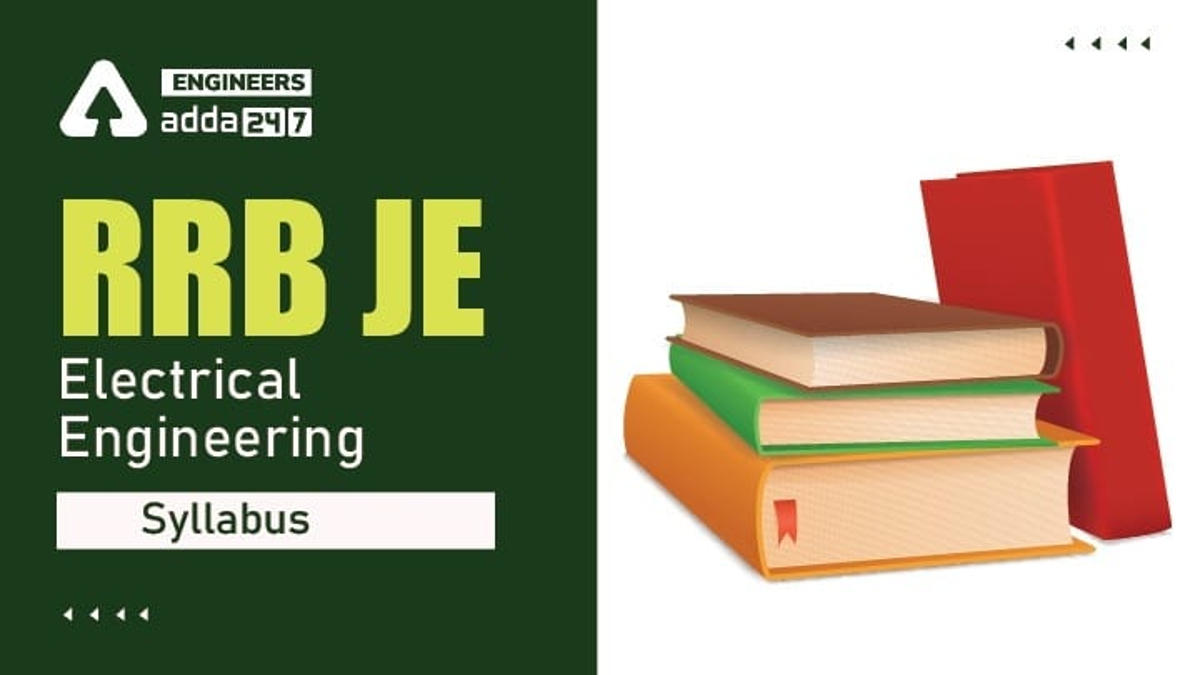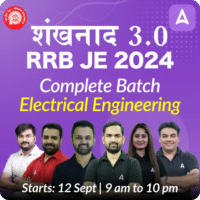Table of Contents
The Railway Recruitment Board (RRB) has announced the RRB JE 2025 Notification to fill 7951 job vacancies. If you’re interested in applying for the RRB JE Recruitment, it’s important to understand the full syllabus and exam pattern to prepare properly. This article will focus on the RRB JE Electrical Syllabus, which covers topics for various positions such as Junior Engineers (JE), Junior Engineers in Information Technology, Depot Material Superintendents (DMS), and Chemical & Metallurgical Assistants (CMA). Make sure to read the entire article to get all the key details about the RRB JE Electrical Syllabus 2025. Also, don’t forget to bookmark this website so you can easily check for future updates on engineering job opportunities.
RRB JE Electrical Syllabus 2025
We have provided a basic overview of RRB JE Recruitment 2025 in a tabulated manner for the ease of the candidates.
| RRB JE Electrical Syllabus 2025 | |
| Name of Exam | RRB Junior Engineer Exam |
| Name of posts | Junior Engineer (JE), Junior Engineer (IT), Depot Materials Superintendent (DMS), Chemical & Metallurgical Assistant (CMA) |
| Category | Engg Jobs |
| Mode of Application | Online |
| Mode of Exam | Online |
| Vacancies | 7951 |
| Exam Type Level | All India Level |
| Official Website | @rrbcdg.gov.in |
RRB JE Electrical Syllabus 2025 In Detail
Here we have provided the detailed syllabus for RRB JE Electrical 2025 in a detailed manner. Candidates must follow this section for the complete information regarding RRB Junior Engineer Electrical Syllabus 2025.
Non-Technical
| Parts | Discipline | Topics |
| Part 1 | RRB JE Syllabus for General Knowledge |
|
| Part 2 | RRB JE Syllabus for General Science |
|
| Part 3 | RRB JE Syllabus for General Aptitude (Mathematics) |
|
| Part 4 | RRB JE Syllabus for General Reasoning |
|
| Part 5 | RRB JE Syllabus for Basics Knowledge of Computers |
|
| Part 6 | RRB JE Syllabus for Fundamentals of Environment |
|
Electrical Engineering
| Sl. No. | Subject |
| 1. | Basic concepts: Concepts of resistance, inductance, capacitance, and various factors affecting them. Concepts of current, voltage, power, energy, and their units. |
| 2. | Circuit law: Kirchhoff‘s law, Simple Circuit solution using network theorems. |
|
3. |
Magnetic Circuit: Concepts of flux, mmf, reluctance, Different kinds of magnetic materials, Magnetic calculations for conductors of different configuration e.g. straight, circular, solenoidal, etc. Electromagnetic induction, self, and mutual induction. |
|
4. |
AC Fundamentals: Instantaneous, peak, R.M.S. and average values of alternating waves, Representation of sinusoidal wave form, simple series and parallel AC Circuits consisting of R.L. and C, Resonance, Tank Circuit. Poly Phase system star and delta connection, 3 phase power, DC and sinusoidal response of R-Land R-C circuit. |
|
5. |
Measurement and measuring instruments: Measurement of power (1 phase and 3 phase, both active and re-active) and energy, 2 wattmeter method of 3 phase power measurement. Measurement of frequency and phase angle. Ammeter and voltmeter (both moving oil and moving iron type), an extension of range wattmeter, Multimeters, Megger, Energy meter AC Bridges. Use of CRO, Signal Generator, CT, PT, and their uses. Earth Fault detection. |
|
6. |
Electrical Machines: (a) D.C. Machine – Construction, Basic Principles of D.C. motors and generators, their characteristics, speed control, and starting of D.C. Motors. Method of braking motor, Losses and efficiency of D.C. Machines. (b) 1 phase and 3 phase transformers – Construction, Principles of operation, equivalent circuit, voltage regulation, O.C. and S.C. Tests, Losses and efficiency. Effect of voltage, frequency, and waveform on losses. Parallel operation of 1-phase/3 phase transformers. Auto transformers. (c) 3 phase induction motors, rotating magnetic field, principle of operation, equivalent circuit, torque-speed characteristics, starting and speed control of 3 phase induction motors. Methods of braking, the effect of voltage and frequency variation on torque speed characteristics, Fractional Kilowatt Motors and Single Phase Induction Motors: Characteristics and applications. |
| 7. | Synchronous Machines: Generation of 3-phase e.m.f. armature reaction, voltage regulation, parallel operation of two alternators, synchronizing, and control of active and reactive power. Starting and applications of synchronous motors. |
|
8. |
Generation, Transmission, and Distribution: Different types of power stations, Load factor, diversity factor, demand factor, cost of generation, and interconnection of power stations. Power factor improvement, various types of tariffs, types of faults, and short circuit current for symmetrical faults. Switchgear and Protection: Rating of circuit breakers, Principles of arc extinction by oil and air, H.R.C. Fuses, Protection against earth leakage / over current, etc. Buchholz relay, Merz-Price system of protection of generators & transformers, protection of feeders and bus bars. Lightning arresters, various transmission and distribution systems, comparison of conductor materials, efficiency of different systems. Cable – Different types of cables, cable rating, and derating factors. |
| 9. | Estimation and costing: Estimation of lighting scheme, electric installation of machines, and relevant IE rules. Earthing practices and IE Rules. |
| 10. | Utilization of Electrical Energy: Illumination, Electric heating, Electric welding, Electroplating, Electric drives and motors. |
| 11. | Basic Electronics: Working of various electronic devices e.g. P N Junction diodes, Transistors (NPN and PNP type), BJT, and JFET. Simple circuits using these devices. |
| Related Articles | |
| RRB JE CBT 2 Exam 2025 | RRB JE Syllabus |



 NMDC JOT Syllabus 2025, Check Subject Wi...
NMDC JOT Syllabus 2025, Check Subject Wi...
 TSGENCO AE Syllabus 2025 With New Exam P...
TSGENCO AE Syllabus 2025 With New Exam P...
 CSIR CEERI Technician Syllabus 2025, Che...
CSIR CEERI Technician Syllabus 2025, Che...
